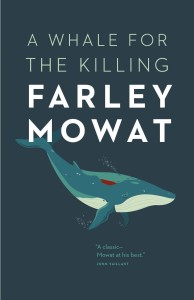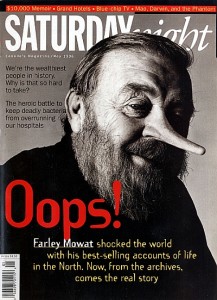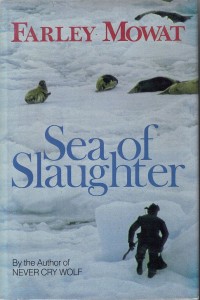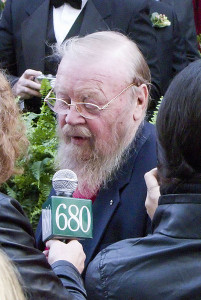The Man I Am Today.
So much I was saving up. The conclusion of the Kawasaki Chronicles. Experimental protocols for dealing with AI-equipped toilets. Fiblets from upcoming stories in Tor.com and Neil Clarke’s latest anthology. Even some award that J. Pekka Mäkelä’s translation of Blindsight just won over in Finland. I was saving it all up for my return to the ‘crawl, which was going to happen once I got out from under today’s keynote address to the International Association of Privacy Professionals (“A Suicide Bomber’s Guide to Online Privacy”— which actually has me kinda scared, insofar as I’m on right after they give an award to Canada’s Privacy Commissioner and I’m about to advocate law-breaking to an audience of lawyers).
All that went out the window on Tuesday. Time for another eulogy.
*
I wanted to be a marine biologist ever since I was around five or six years old. I still remember the moment.
 It wasn’t until the age of fourteen, though, that I decided to specialize in marine mammals. I remember that moment too: it was the day I finished reading A Whale for the Killing, by Farley Mowat.
It wasn’t until the age of fourteen, though, that I decided to specialize in marine mammals. I remember that moment too: it was the day I finished reading A Whale for the Killing, by Farley Mowat.
If you’re not Canadian, chances are you have no idea who the hell I’m talking about. Even if you are Canadian you might not have known until you woke up and found the man’s face plastered across the home page of your local news site. Farley Mowat was an author and (as all authors are) a liar, a gadfly and a conservationist. He was a passionate advocate on behalf of the biosphere, even though he got a lot of his facts wrong. (He was frequently referred to among my biologist buddies as “Hardly Know-it”.) He wrote Never Cry Wolf, a piece of semi-fictional propaganda massively influential in rehabilitating the wolf’s image in popular culture (and which was turned into a really good movie of the same name). He wrote the aforementioned A Whale for the Killing, which the Newfoundlanders it excoriated also describe as propaganda. (Not having been there I cannot judge, but the wanton cruelty described by that book certainly seems consistent with what I know of human nature.) It, too, was made into a movie: a significantly crappier made-for-TV production starring Peter Strauss as a noble American who takes a brave stand against Canadian hicks and savages bent on slaughtering one of nature’s most magnificent creatures. Or something.
 Mowat wrote dozens of books, and numerous shorter works for newspapers and magazines. One of these, back around 1981, accused scientists at the University of Guelph of putting out the eyes of captive seals with red-hot pokers. As it happened, I was a scientist (okay, grad student) at Guelph when that story ran; the first I learned of these atrocities was when a friend phoned me in the wee hours, rousing me from sleep to express her outrage at my barbaric behavior. (I was actually studying porpoises at the time, but apparently the body count of skewered-eyed seals was so high that everyone in the department pretty much had to be involved).
Mowat wrote dozens of books, and numerous shorter works for newspapers and magazines. One of these, back around 1981, accused scientists at the University of Guelph of putting out the eyes of captive seals with red-hot pokers. As it happened, I was a scientist (okay, grad student) at Guelph when that story ran; the first I learned of these atrocities was when a friend phoned me in the wee hours, rousing me from sleep to express her outrage at my barbaric behavior. (I was actually studying porpoises at the time, but apparently the body count of skewered-eyed seals was so high that everyone in the department pretty much had to be involved).
It did not endear me to the man.
 Mowat followed me to British Columbia in 1984. I went to pursue a doctorate; he dropped by a couple months later to pimp his new book Sea of Slaughter (another enormously popular and influential tome, this time documenting Canada’s ongoing eradication of marine life along the Atlantic seaboard). My supervisor was one of three biologists who chatted with the man onstage during his appearance, so I managed to scam a good seat; and when they opened the floor to questions I put up my hand.
Mowat followed me to British Columbia in 1984. I went to pursue a doctorate; he dropped by a couple months later to pimp his new book Sea of Slaughter (another enormously popular and influential tome, this time documenting Canada’s ongoing eradication of marine life along the Atlantic seaboard). My supervisor was one of three biologists who chatted with the man onstage during his appearance, so I managed to scam a good seat; and when they opened the floor to questions I put up my hand.
I pointed out the irony of finding one’s chosen profession— finding one’s chosen department— slandered by the very man whose writing had led me there in the first place. I asked where the hell he’d got the idea that we were puncturing seal eyeballs with red-hot pokers.
I’m not quite sure I bought his explanation. He said he’d heard that anecdote during a phone call with a certain marine mammal guy over in the veterinary college— someone who was known for his rough treatment of mammals, and not just marine ones (he sat on my committee; my thesis acknowledgements credit him for teaching me “the meaning of fear”). Still, this seemed way beyond the pale even for him. In hindsight I’m guessing there must have been a bad connection, a misheard phrase.
My point, though, is: Mowat came clean. He apologized immediately and with no defensiveness. “I was wrong,” he admitted. I remember wishing that real scientists admitted to their mistakes with such grace.
 That was the sum total of my interaction with the man. He popped up on the radar now and then over the following years: when the Ontario Science Center tried to get him involved in a whale display that fell through when he demanded to be put in charge of the project; when he was refused entry to the US as an “undesirable element” (which re-endeared me even more). Over time I came to regard Mowat pretty much the way I regard David Suzuki: fallible, egotistical, maybe even corrupt— but on balance, someone who does more good than harm.
That was the sum total of my interaction with the man. He popped up on the radar now and then over the following years: when the Ontario Science Center tried to get him involved in a whale display that fell through when he demanded to be put in charge of the project; when he was refused entry to the US as an “undesirable element” (which re-endeared me even more). Over time I came to regard Mowat pretty much the way I regard David Suzuki: fallible, egotistical, maybe even corrupt— but on balance, someone who does more good than harm.
It’s not the sort of epitaph you can apply to many, these days.
Now he’s dead at 92, and for some reason I feel compelled to remark on the fact. I certainly didn’t know the man; one heckle from the cheap seats doesn’t make a relationship. I can’t even describe him as a major influence on my life. But he was a seminal one; he showed up at just the right moment, and nudged. His book was the butterfly that edged my life onto a whole new trajectory, set the course for my career during the last quarter of the Twentieth Century.
In a very real way, Farley Mowat made me the man I am today.








Jeeze Louise.I actually met the man at a pre-release premiere for “Never Cry Wolf” at DC’s American Film Institute sponsored by The Wilderness Society where his influence ran wide and deep. Add to this that my father knew him by reputation for his spooky behind-the-scenes work in the Netherlands in the final days of WWII where he was evidently one of those Great Canadian Heroes you never would hear about unless you were Canadian or watched a lot of late-night History Channel (or were also involved in end-off-war special mission type stuff). A lot of legend, a bit of charlatanry, loads of influence and guaranteed to start some controversy.
RIP. Another fine eulogy.
Oh, no fear on that, we Americans know Farley Mowat, and mourn same. But he had a good run at 92, and no one put out his eyes with red hot pokers, so ….
I had no idea he was influential on you that way Peter, because his book Never Cry Wolf was highly influential in MY studying biology (and hence meeting you). Years later I worked with him on a project and got to ask him lots of questions….including asking him why he misrepresented the biology of the humpback whale featured in A Whale for the Killing saying that they had sonar when it was known then that they did not. His reply was that he knew that, but that he “never let the truth get in the way of getting a point across”. Other parts of conversations with him on those days (some considerably under the influence) were highly influential on me yet again, and they are one reason why I don’t work as a biologist now but instead in related areas. Despite all the criticisms that have been aimed at him over the years, the one thing I most admire about him is that I am totally convinced that he always stood up for what he believed in. In this day and age when peoples mores and morals sway in even slight breezes it’s something to be admired.
A nice commentary on your part, btw.
Who could believe that Guelph grad students would poke seal’s eyes out with red hot pokers. Next, someone will say that they drilled holes through porpoise find to attach radio transmitters. Thankfully I only killed animals by the thousands, if not millions, with formaldehyde. Good thing that Greenpeace has not taken an interest in Copepoda and tintinnids yet.
A sad loss… I love his writing, though I disagree with much he wrote. He is one of the writers whose work sent me north. He will be greatly missed, but he seems to have lived pretty much as he wished. His thoughts and opinions will live on, which is a solid achievement for anyone.
Chunks of the movie Never Cry Wolf were filmed near Atlin, BC and in the table-lands at the summit of the Chilkoot pass…gorgeous spots an hour/couple hours south of here. I Must remember to re-watch it soon in memory of Mowat.
A good eulogy, Peter.
I read The Dog That Wouldn’t Be when I was about 13 or so. He describes how he could just take the trolley to the end of the line, hop off, and he’d be in wild country, or at least something that could pass for it. I used to think of this when I went up to the Bayview and Sheppard intersection to catch the bus to school; I’d look off at the development that stretched off to every horizon, and feel so fucking jealous of someone who got to grow up like that.
It’s not the sort of epitaph you can apply to many, these days.
Not that it has ever, been any different.
The Dog Who Wouldn’t Be, Owls in the Family, and The Boat Who Wouldn’t Float were three of my favorite books in 7th grade. The Dog Who Wouldn’t Be is laugh-out-loud funny
And we lost H.R. Giger.
Though he did not make me the messed up man I am today, his stuff in my head probably contributed. 🙂
Yeah, I know that actual wolf biologists say that most of “Never Cry Wolf” is wrong, but I never cared about that, because (a) it portrayed wolves just as… wolves, not as monsters from Hell that need to be exterminated, and (b) it was a really good movie.
American here, chiming with a data point–Never Cry Wolf was required reading in high school.